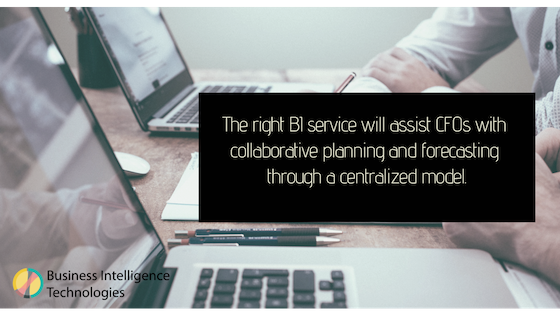More than ever, CFOs are expected to look at past and present performance to formulate dynamic future growth strategies that will guide a company through the competitive landscape.
They must consider revenue targets; gross margin goals; keeping costs down while increasing sales funnels; investment opportunities; business risk areas; current cash flow status and liquidity—all this and more. While looking at how these and other metrics can be continually improved, they must advise topmost management about the best future course of the business.
For strategies to be effective, CFOs must be proactive, not reactive. Data needs to be available immediately so that these strategies can be altered according to dynamic changes in the market, not only at intervals, i.e., when standard financial statements are typically generated.
This is easier said than done. With the inordinate amount of disparate data that businesses generate on a daily basis, it’s hardly surprising that more than half (53%) of CFOs have stated that mastering data is their top concern, according to a 2018 Accenture report.
So how can Business Intelligence services help CFOs to streamline their strategic formulation process and support them to make better decisions based on more insightful information? Let’s take a look.
Corporate Performance Management and Dashboards
In a survey done by PWC, 73% of CFOs said that corporate performance management (CPM)—i.e., tasks typically associated with forecasting, budgeting and planning—is their top priority but, in the same breath, 89% said they want to improve their reporting and dashboards to help them better assess their company’s current performance.
This indicates that a large majority of CFOs realize that CPM is hugely important to the future success of their business, but that they also value dashboarding and reporting tools, i.e., which are typically concerned with “Actuals.”
The right Business Intelligence service can help CFOs not only to capture data from disparate sources for “Actuals” reporting, but also to use this data as the basis for future-oriented applications. After all, behind every beautiful dashboard is a process of data capturing and organizing—call it “data-model building.” With the right BI service, CFOs can have the beautiful dashboard, giving them confidence in their “Actuals” numbers, as well as future-based models designed for the strategic business advisory role, which CEOs depend on them heavily to deliver.
Real-time data discoveries that look to past, current and “what if” performance will enable CFOs can quickly answer any business questions thrown their way by other C-suite executives and investors; they will be able to far more accurately predict future trends and implement dynamic growth strategies by being able to react quickly to changing market conditions.
Financial Reporting and Planning—and Collaborative Models
Financial reporting and planning are core to the CFO role. Having accurate financial information is essential in the budgeting process, in carrying out variance analysis, and in implementing future decisions based on past performance.
These tasks rely on effective collaboration among team members across multiple business functions. The problem is that this can lead quite easily to independent, static data stores (such as individual Excel spreadsheets) that impact the accuracy and effectiveness of the financial information. In the same Accenture report, 76% of CFOs agree that without “one version of the truth” across business units, their organization will struggle to meet its objectives.
Once again, the right BI service will assist CFOs with collaborative planning and forecasting through a centralized model that allows users to gather live data and simultaneously input their own information. Bi-directional communication between data models and the user interface—which could still be Excel—will further help CFOs to produce dynamic planning models that are up to date and accurate.
A robust BI solution, in sum, will enable CFOs to access future-oriented business intelligence from dynamic models (e.g., budget models) that are dynamic, responsive to user input, and foster collaboration.
So going back to our original question: Can CFOs really benefit from Business Intelligence services? The evidence would strongly suggest that this is a definite Yes, provided that planning capabilities are available. Today’s modern CFO faces high expectations from CEOs, C-suite executives and external stakeholders to be the organization’s core strategic enabler for profitable growth. A powerful BI service that enables proactive future-based decision-making will deliver capabilites for CFOs to step into that role with confidence.
Subscribe to our blog!
Don't miss a post. Receive the latest blogs from BI Tech straight in your inbox.


